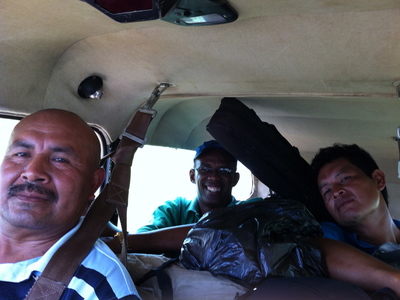
Juggling Bible Workers
When you don’t have enough pastors to cover all the new churches in the interior, Â sometimes you have to do a little juggling act. Â And when you’re talking about vast expanses of raw jungle and rivers, the only practical to do this is to use an airplane.
Two weeks ago I heard through the jungle “grape vine†that the church in Kopinang was having a hard time. This wasn’t a particular surprise to me.
Whenever we start new work in an area, it takes about 5-7 years of hard work to build up the congregation and help them to become grounded in the truth of the bible. When new church is planted, many of the new believers still retain some of their former habits, and are almost completely biblically illiterate. It’s one thing if there is a christian foundation to build on, but because many of these people have read almost nothing in the bible, they don’t have much to go on. Â So it takes years to build them up in the faith. Â Incidentally, this is also the reason why we must strongly consider planting a bible worker, with every new church plant. Â They need to be shepherded, at least for the first few years.
So when I heard from a neighbouring village that the Kopinang church wasn’t doing so well, I wasn’t particularly surprised. Â But, what was different, and especially worrisome was the rumor that the predominantly Catholic church in Kopinang was looking to shut down the church. I didn’t know how true this was, but I decided to take some action.
Since we don’t have a local pastor close to Kopinang in Region #8, I decided on one of my trips out to Region #7 (North of Region #8) to have a heart to heart chat with our Adventist Pastor out there. Pastor Casey is a well loved Amerindian pastor who knows how the indiginous people think and act. Â So I took some time on the ground in Kopinang Village to asked whether he would be willing to fly down to Kopinang and scope out the situation.
Not only did he agree to go for a week but he also brought one of his best bible workers along to show him the area.
This last week we made the flight. Â On the way South from Kamarang Village, we briefly stopped in at another village to drop off some food supplies for another missionary couple who are serving in a the tiny jungle village of Wax Creek. They were all smiles to get their cassava bread, dried fish, flour, and other supplies. Â Incidentally they walked out 4-5 hours to meet the airplane.

As the airplane climbed back into the air, I new that we were extremely short on time. Â There simply wasn’t enough sunlight to do all the flights. By the time I dropped Pastor Casey and Orin Andries off in Kopinang I was racing to try and beat the sun to the horizon, but I couldn’t go to Georgetown quite yet. Â I still had one more shuttle to do.

I still had a Malaria team from the Ministry of Health that was needing to be shuttled from the mining town of Mahdia over to Chennapau. To give you and idea of how this works, Mahdia is a huge mining area in Region 8 as the base of the Pakaraima Mountains. Â The village of Mahdia is connected to Georetown through a rough dirt road, so getting into Mahdia is relatively easy. But that is as far as the road goes. Food, supplies and people have to be shuttled across the mountains to the other villages of Region 8.
Also, you need to understand, that Region 8 is one of the major problem areas for Malaria. Â The government is concerned because Malaria on a whole is on the rise, and there is some indication that perhaps the strains that we have here in Guyana are starting to become drug resistent. That coupled with the loss of international funding for malaria control, is causing those in authority to become very concerned about the problem. Â Three weeks ago, the vector control officers, who are in charge of malaria management for the entire country, showed up on our door step here at the hospital. Â Basically they are asking for our assistance in helping transport their people around the interior, since transportation is such a big problem. They need help in waging this deadly war against Malaria, and while we can’t drop everything that we’re doing, we are going to help them as much as possible.
When I touched down in Mahdia, the two malaria specialists were standing on the airstrip waiting for me. What the person on the phone from Georgetown didn’t tell me was that the one guy was about 275 lbs, and both persons had several hundred pounds of gear and food to go with them. On top of this I had another pastor who was riding with me back to Georgetown. The only saving factor was that this was the very last shuttle of the day and I had already burned off a lot of fuel. Â We were right at gross weight.
Twenty minutes later we let them off in Chenapau Village. I had just enough time to dump into my wing another jug of fuel, and take on another passenger bound for Georgetown.
I new I was too late… There was no way for me to get back to Georgetown by sunset, so my wife dutifully called the tower and requested permission to land after sunset. The controller was very nice and gave us another 10 minutes to make it in. Â As I remember we landed with two minutes to spare.

